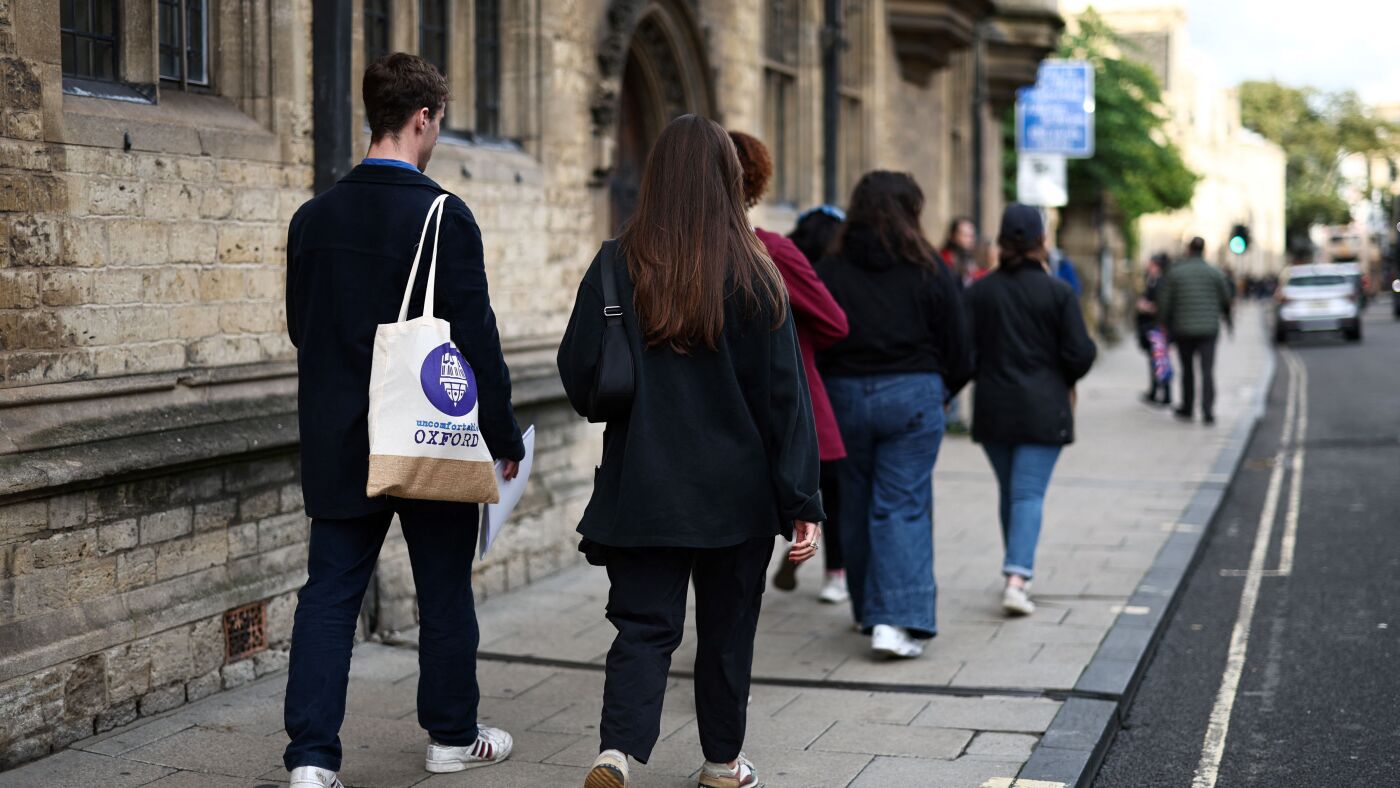
A tour guide walks with a group of people attending an Uncomfortable Oxford Tour, in Oxford, on Oct. 20, 2023.
Henry Nicholls/AFP via Getty Images
hide caption
toggle caption
Henry Nicholls/AFP via Getty Images
LONDON — As the United States considers tightening visa restrictions for international students, the ripple effects may extend beyond its borders, particularly impacting British universities. With the potential decline in international student numbers in the U.S., top U.K. institutions might see a surge in applications from students seeking alternatives.
Currently, more than a million international students are enrolled in U.S. colleges, contributing approximately $50 billion annually to the economy. Yet, recent data indicates a significant drop in interest for U.S. institutions, with some estimates suggesting a sharp decline in searches since the beginning of the year.
Simon Marginson, a professor at Oxford University specializing in international higher education, notes, “There’s been a dramatic shift in relation to interest in studying in the United States.” He highlights a significant drop in online search activities for U.S. study opportunities.
Uncertainty drives students to consider alternatives
Some education consultants in the UK are witnessing this uncertainty among British students firsthand. David Hawkins, founder of The University Guys, advises students to scrutinize U.S. policy changes carefully, although he acknowledges the prevailing apprehensions.
Hawkins states, “It’s those people who have options, who are looking at the U.S. with quite big question marks right now.” He suggests that students may opt for other countries like Canada or remain in the UK if they secure admission to elite institutions like Oxford or Cambridge.
Similarly, Sam Cox from A-List Education mentions, “There is still a real strong appeal to, particularly, an Ivy League education,” but acknowledges that students and their families are exploring backup plans.
Financial implications for U.K. universities
Nick Hillman of The Higher Education Policy Institute explains the financial reliance of U.K. universities on international students. “International students are literally keeping our universities going,” he says, emphasizing that their fees help subsidize the costs of educating domestic students and conducting research.
While U.K. institutions might benefit in the short term from increased international interest, Hillman warns that “the cause of global research may very well suffer” due to potential barriers to academic collaboration.
Impact on access and diversity
The shifting dynamics could influence access to top U.K. universities, especially for domestic students from disadvantaged backgrounds. Kalwant Bhopal from Birmingham University raises concerns about the potential influx of wealthy international students, which might further limit opportunities for less privileged students.
Bhopal argues, “Higher education actually has become a capitalist enterprise,” suggesting that financial motives could influence university admissions decisions.

Demonstrators rally on Cambridge Common in a protest organized by the City of Cambridge calling on Harvard leadership to resist interference at the university by the federal government, in Cambridge, Mass., April 12.
Nicholas Pfosi/Reuters
hide caption
toggle caption
Nicholas Pfosi/Reuters
The effects of uncertainty
The current atmosphere of uncertainty is affecting perceptions globally. David Hawkins highlights the gap between perception and reality, noting, “People are seeing these headlines that seem to be coming quickly, and it’s definitely having cut through. But the reality is much more nuanced than that.”
Hawkins advises students and their families to look beyond the headlines to understand the broader implications. Nicholas Barr from the London School of Economics adds that the unpredictability of U.S. policy could have long-lasting effects, causing potential students and their families to worry about future changes.
Long-term consequences for global research
While U.K. universities might benefit from increased international interest in the short term, the potential challenges to global research collaboration are a concern for many academics. Simon Marginson emphasizes the importance of international education in sustaining U.S. research, particularly in STEM fields.
Nick Hillman warns that the long-term consequences could be detrimental to global academic cooperation. He stresses that universities like Oxford may not find any joy in the difficulties faced by U.S. institutions, as they often collaborate on joint research projects.
The potential loss of soft power is another concern. Hillman notes the influence gained by educating future world leaders from other countries, which is a significant advantage the U.S. could lose if international student numbers decline.
As the situation continues to unfold, British universities and policymakers remain vigilant, understanding that changes in U.S. policies could have far-reaching effects on the global educational landscape.










Be First to Comment